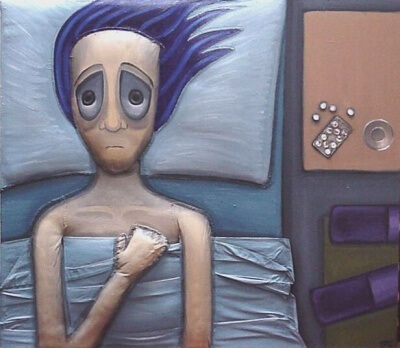Do You Suffer From Nighttime Anxiety?

Having thoughts that prevent us from relaxing and falling asleep at sundown is a symptom that anxiety has gained space, and a very important space, in our lives. Nighttime anxiety is caused by the high levels of stress that we generate during the day, whether due to work, family, the sum of the tensions in those two areas, or it can even appear without our knowing how to identify a reason. It is characterized by worry and nervousness when the time comes to rest.
Nighttime anxiety is one of the most frequent manifestations of disorders associated with sleep. Fear takes over the person who suffers it and their sleep has to start over again constantly, so it is difficult to achieve deep sleep phases.
Generally, people who suffer from nighttime nervousness are often distracted and have difficulty concentrating during the day. This is because nocturnal anxiety attacks prevent rest and this affects the diurnal routine of that person.
As far as sleep is concerned, quality is better than quantity. If we focus on the thought of not being able to sleep instead of trying to relax and think that we will sleep through the night, it will be harder for us to sleep. Therefore, we must wait for sleep understanding that this will happen as the natural process that it is, without anticipating that it will not make the appointment.
It is paradoxical that the fact that sleep, being as it is so necessary for survival and good psychological functioning, presents a wide range of disorders and dysfunctions that in many cases require a complex intervention.
To overcome anxiety at night we can try to identify the cause during the day and acquire enough skills so that it stops having influence. Once we have overcome fears and worries, anxiety and its symptoms will disappear.
Causes of nocturnal anxiety
Anxiety has no schedule, and so we may suffer from nighttime anxiety although this is a time when, in theory, we should be relaxed. In this sense, anxiety is an emotion that we should not underestimate since its energy, if misguided, can accumulate and cause us many problems.
Anxiety disorders have so many ways of manifesting that it is very difficult to make a systematic classification of them and identify their causes. There are people who experience a lot of agitation, while others remain paralyzed. Similarly, there are people who notice they have more anxiety in the morning, while others panic at the time they go to sleep.
Our worries cause us anxiety, and it is these that ultimately rob us of the hours of sleep. They are the main cause of nighttime anxiety. Worrying about the future and anticipating events make us more vulnerable to stress and sleeping problems. Difficulties with disconnecting when going to bed, excessive work during the day and emotional problems are the main causes of our worries and, therefore, of nighttime anxiety.

However, there is a key difference: at night most of the problems that concern us cannot be solved. So, turning them around in our head only increases our worrying and activates us, a state opposite to that which attracts sleep.
On the other hand, high levels of anxiety accumulated and experienced during the day make it so people who are more prone to anxiety cannot sleep. They find it hard to fall asleep as a result of constant fatigue, low daytime performance and the discomfort that all that brings with it.
Anxiety, when it overcomes us, takes control. In addition, when it takes control it usually leads us to behaviors that eliminate emotion for a while, so that it “comes back” more strongly. One of these behaviors that makes anxiety stop then return to “assault” us even more is midnight snacking.
In addition, symptoms of anxiety during sleep are usually preceded by previous images in our mid of anxiety (daytime anxiety images). These pictures are usually accompanied by tachycardia, anguish, a feeling of suffocation and a startled awakening.
“Some thoughts are too angry to sleep. They lie awake all night and become obsessions.”
-Marty Rubin-
How to deal with insomnia caused by anxiety?
The most common thing is that people suffering from this type of disorder look for substances or medicines that allow them to calm down and sleep better. However, we are rarely aware that most cases of nocturnal anxiety can be redirected through a series of guidelines, and the use of drugs or herbs is not always the best solution.
Anxiety is highly linked to what we do, think and feel, so depending on how we manage these three aspects during the previous moments of sleep we will be calmer or more nervous. The treatment for nighttime anxiety can be divided into two large blocks.

First, we must produce a change in the habits we have before sleeping. Once that is achieved, we have to learn to deal with daily concerns and leave a space for them away from nighttime. Confronting concerns early in the day gives us a more focused approach and more time to solve them.
A good practice to achieve a pleasant sleep is to exercise before going to sleep, since the mind will keep us awake but our body will be tired. This will help us achieve sleep more easily. It is also important to avoid alcohol and caffeinated drinks a couple of hours before going to sleep.
If we wake up during the night, we have to try to keep our eyes closed and think of the very relaxing and satisfying feeling that sleep gives us. The ideal way to counter insomnia is to stop worrying about problems that we cannot solve from bed. Let go of worry, free ourselves, and sleep will come.
Here are 7 steps to confronting nighttime anxiety:
- Keep a regular schedule. Insomnia and nighttime anxiety can also occur because of not having a defined schedule. Sleeping every day at the same time, with a maximum difference of approximately 30 minutes, regulates our circadian rhythms allowing a natural and quality sleep to occur.
- Avoid overeating before going to bed. We should be especially careful about how we eat at night, as heavy meals can cause difficulties in falling asleep.
- Create a pleasant atmosphere before sleeping. We must take care of the space where we sleep: a comfortable pillow, a good temperature, are factors that can cause a poor quality of sleep and can make us wake up at midnight and have trouble sleeping properly.
- Use the bed only to sleep. Experts say that the room should be used to sleep or have sex if we want to sleep better, so they do not advise having the computer in this space of the house. Also, having television nearby can be counterproductive, especially if we go to bed with the TV on.
- Practice relaxation exercises. Doing relaxation exercises seems to have a positive effect when it comes to combating anxiety, stress or insomnia.
- Perform deep breathing. This exercise will allow us to focus our attention on our own breathing, and in that way avoiding any thought that can make us nervous and prevent us from sleeping. Here is an example of a deep breathing exercise:
– Breathe deeply through the diaphragm, directing your attention to your movement and the air that enters and leaves your belly.
-Let the air out slowly through the mouth and for each breath in mentally repeat a word or phrase like “I’m calm” or “I’m so sleepy.” At the same time, imagine a landscape or a mental image that transmits calm and serenity.
-Don’t try to attract sleep directly with thoughts that hint at sleep. Look for relaxation, not sleep. If you relax, sleep will invade you.
- Prohibit negative thoughts from entering your brain before going to sleep. Do not try to do it directly, do it by attracting thoughts that relax you and that never cause worrying.

Insomnia is not a good companion. In fact, people with insomnia suffer, and much more. A good rest is precisely one of the best tools for not accumulating failures during the day, and therefore problems and concerns that assail us during the night. There is a cycle that feeds itself, both when it rotates in a positive sense and when it does in a negative sense. The good thing is that it is in our hands that that cycle is positive and not negative.
Bibliography
Aguirre, F. (2013). Combatir la ansiedad: síntomas y tratamiento. Revista Vinculando.
Antón, A. (2014). Tratamiento cognitivo-conductual en un niño con ansiedad a la hora de dormir. Revista de Psicología Clínica con Niños y Adolescentes, 1(1).
González, M. Á. M., & Ortuño, F. (2016). Tratamiento del insomnio. Medicine-Programa de Formación Médica Continuada Acreditado, 12(23), 1359-1368.
Subirana, S. R., & Adell, M. À. M. (2014). Tratamiento de la agitación nocturna y el insomnio en el mayor. FMC-Formación Médica Continuada en Atención Primaria, 21(2), 104-112.
This text is provided for informational purposes only and does not replace consultation with a professional. If in doubt, consult your specialist.








